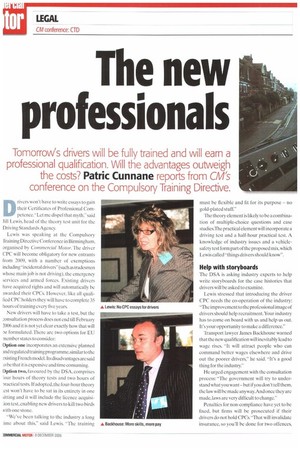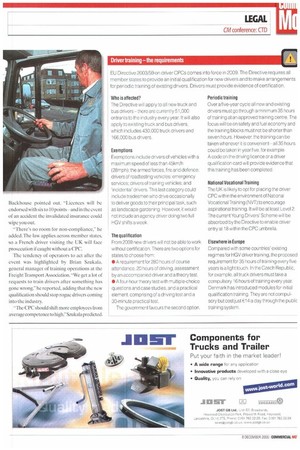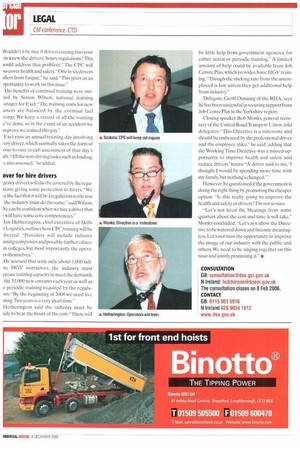The new professionals
Page 42

Page 43

Page 44

If you've noticed an error in this article please click here to report it so we can fix it.
Tomorrow's drivers will be fully trained and will earn a professional qualification. Will the advantages outweigh the costs? Patric Cunnane reports from CM'S conference on the Compulsory Training Directive.
Drivers won't have to write essays to gain their Certificates of Professional Cornpetence, -Let me dispel that myth," said Jill I ,ewis, head of the theory test unit for the Driving Standards Agency.
Lewis was speaking at the Compulsory Raining Directive Conference in Birmingham, organised by Commercial Motor. The driver CPC will become obligatory for new entrants from 2009, with a number of exemptions including incidental drivers" (such as tradesmen whose main job is not driving), the emergency services and armed forces. Existing drivers have acquired rights and will automatically be awarded their CPCs. However, like all qualified CPC holders they will have to complete 35 hours of training every five years.
New drivers will have to take a test, but the zonsultation process does not end till February 2006 and it is not yet clear exactly how that will [le formulated. There are two options for EU member states to consider: Option one incorporates an extensive planned and regulated training programme, similar to the ..x-isting French model, ts disadvantages are said :o be that it is expensive and time consuming. Option two, favoured by the DSA, comprises four hours of theory tests and two hours of mactical tests. If adopted, the four-hour theory :est won't have to be sat in its entirety in one itting and it will include the licence acq uisi:ion test, enabling new drivers to kill two birds Afith one stone.
"We've been talking to the industry a long .ime about this." said Lewis. —The training must be flexible and fit for its purpose — no gold-plated stuff."
The theory element is likely to be a combination of multiple-choice questions and case studies.The practical element will incorporate a driving test and a half-hour practical test. A knowledge of industry issues and a vehiclesafety test form part of the proposed mix, which Lewis called "things drivers should know".
Help with storyboards
The DSA is asking industry experts to help write storyboards for the case histories that drivers will be asked to examine.
Lewis stressed that introducing the driver CPC needs the co-operation of the industry: "The improvement to the professional image of drivers should help recruitment. Your industry has to come on board with us and help us out. It's your opportunity to make a difference."
Transport lawyer James Backhouse warned that the new qualification will inevitably lead to wage rises. "It will attract people who can command better wages elsewhere and drive out the poorer drivers," he said. -It's a good thing for the industry."
He urged engagement with the consultation process: "The government will try to understand what you want— but if you don't tell them, the law will be made anyway.And once they are made, laws are very difficult to change."
Penalties for non-compliance have yet to be fixed, but firms will be prosecuted if their drivers do not hold CPCs. "That will invalidate insurance, so you'll be done for two offences, Back house pointed out. "Licences will he endorsed with six to 10 points—and in the event of an accident the invalidated insurance could wipe you out.
"There's no room for non-compliance," he added. The law applies across member states, so a French driver visiting the UK will face prosecution if caught without a CPC.
The tendency of operators to act after the event was highlighted by Brian Szukala, general manager of training operations at the Freight Transport Association. We get a lot of requests to train drivers after something has gone wrong," he reported, adding that the new qualification should stop rogue drivers coming into the industry.
"The CPC should shift more employees from average competence to high." Szukala predicted. Wouldn't it be nice if drivers coming into your rm knew the drivers' hours regulations? This tould address that problem.The CPC will so cover health and safe ty."One in six drivers iffers from fatigue." he said. "This gives us an 3portunity to work on this issue."
The benefits of continual training were outled by Simon Wilson, national training anager for Exel: -The training costs for new arters are balanced by the eventual fuel wings. We keep a record of all the training e've done, so in the event of an accident we in prove we trained this guy."
Exel runs an annual training day involving iery driver, which normally takes the form of one-to-one in-cab assessment of that day's lift."All the non-driving tasks, such as loading, also assessed," he added.
over for hire drivers
gency drivers will also be covered by the regutions, giving some protection to hirers. "We [e the fact that it will be a regulation so the rest the industry must do the same," said Wilson. /Ve can be confident when we hire a driver that will have some core competencies."
Ian Hetherington, chief executive of Skills r Logistics, outlines how CPC training will be :livered: "Providers will include industry aining companies and possibly further educam colleges, but most importantly the operars themselves."
He warned that with only about 1,000 fullne HGV instructors, the industry must crease training capacity to meet the demands the 51,000 new entrants each year as well as e periodic training required by the regulamis: "By the beginning of 2008 we need live sting.Two years is a very short time."
Hetherington said the industry must be ady to bear the brunt of the cost: "There will be little help from government agencies, for either initial or periodic training." A limited amount of help could be available from Job Centre Plus, which provides basic HGV training. "Though the sticking rate from the unemployed is low unless they get additional help from industry."
Delegate, Geoff Dunning of the RHA, says he has been successful in securing support from Job Centre Plus in the Yorkshire region.
Closing speaker Bob Monks, general secretary of the United Road Transport Union, told delegates: "This Directive is a milestone and should be embraced by the professional driver and the employer alike,he said, adding that the Working Time Directive was a missed opportunity to improve health and safety and reduce drivers' hours: "A driver said to me, thought 1 would be spending more time with my family, but nothing's changed.— However, he questioned if the government is doing the right thing by promoting the cheaper option: "Is this really going to improve the health and safety of drivers? I'm not so sure.
-Let's not heed the bleatings from some quarters about the cost and time it will take," Monks concluded. "Let's not allow the Directive to be watered down and become meaningless Let's not miss the opportunity to improve the image of our industry with the public and others. We need to be singing together on this issue and jointly promoting it." •




































































































































































































